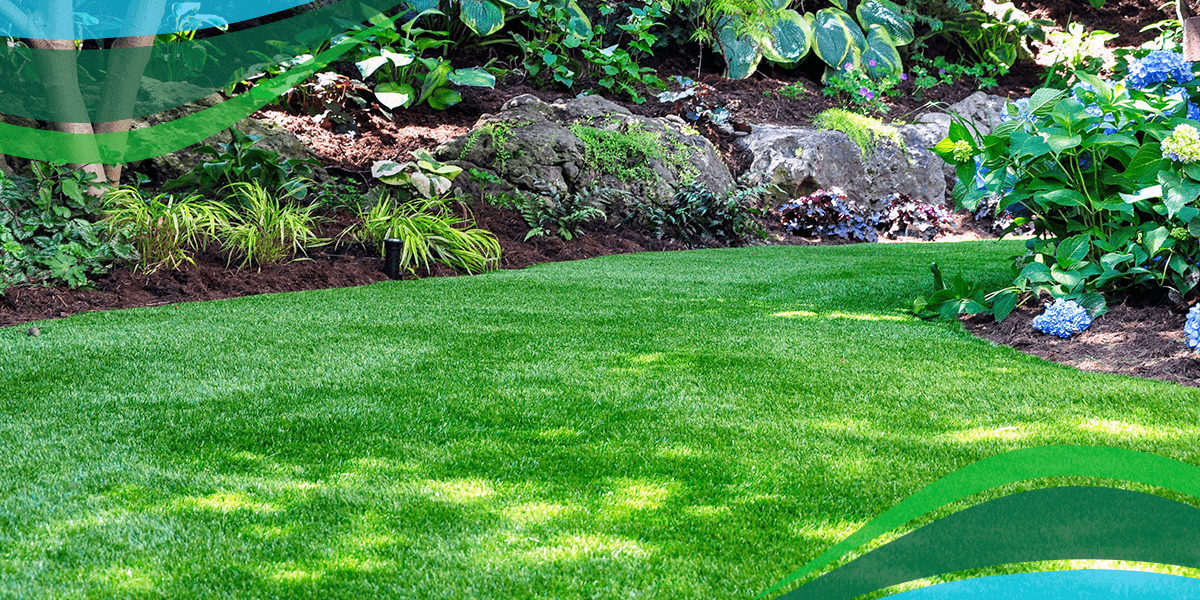Environmental Benefits

Organic lawn care practices offer a multitude of environmental benefits, contributing to a healthier ecosystem and a more sustainable future. By choosing organic methods, you can minimize your impact on the environment and create a thriving lawn that supports biodiversity.
Soil Health
Healthy soil is the foundation of a thriving lawn and a healthy environment. Organic lawn care practices significantly enhance soil health through improved water retention and nutrient cycling.
- Improved Water Retention: Organic matter, such as compost and leaf mold, acts like a sponge, increasing the soil's ability to hold water. This is crucial for drought-resistant lawns and reduces the need for excessive watering, conserving water resources.
- Enhanced Nutrient Cycling: Organic matter provides essential nutrients for plant growth, reducing the need for synthetic fertilizers. Microorganisms in the soil break down organic matter, releasing nutrients in a slow and steady manner, promoting healthy root development and overall plant health.
Reduced Pollution and Greenhouse Gas Emissions
Organic lawn care practices significantly reduce pollution and greenhouse gas emissions compared to conventional methods.
- Reduced Water Pollution: Synthetic fertilizers and pesticides can leach into waterways, polluting water sources and harming aquatic life. Organic methods eliminate these harmful chemicals, protecting water quality.
- Reduced Greenhouse Gas Emissions: The production and application of synthetic fertilizers contribute to greenhouse gas emissions. Organic methods, relying on natural inputs, minimize these emissions, contributing to climate change mitigation.
Biodiversity and Beneficial Insects
Organic lawn care practices create a welcoming habitat for beneficial insects and promote biodiversity in your yard.
- Habitat for Beneficial Insects: Organic methods, by avoiding pesticides, allow beneficial insects, such as ladybugs and lacewings, to thrive. These insects naturally control pest populations, reducing the need for chemical intervention.
- Increased Biodiversity: Organic lawns attract a wider variety of plant and animal life, creating a more diverse and resilient ecosystem.
Cost-Effectiveness

While organic lawn care might seem like an expensive upfront investment, it can actually save you money in the long run. This is because organic methods promote healthy soil, which leads to a more resilient lawn that requires less maintenance and fewer costly interventions.
Comparing Costs
Organic lawn care involves using natural fertilizers and pest control methods, which can be more expensive than their chemical counterparts. However, the initial investment in organic materials can be offset by the long-term savings you'll reap. For example, while organic fertilizers might cost more per pound, they are often more concentrated and require less frequent application. This can result in significant cost savings over time.
Reducing Water Consumption
Organic methods, such as using compost and mulches, improve soil structure and water retention. This means your lawn will need less watering, resulting in significant savings on your water bill. A healthy, well-established lawn with a good root system can also absorb water more effectively, further reducing the need for frequent watering.
Saving on Fertilizer Expenses
Organic fertilizers, such as compost and manure, are rich in nutrients and release them slowly into the soil. This means you won't need to apply fertilizer as often, saving you money in the long run. Chemical fertilizers, on the other hand, can leach out of the soil quickly, requiring more frequent applications and leading to higher costs.
Increasing Property Value
A healthy, vibrant lawn can increase your property value. Organic lawn care methods promote a thriving ecosystem, which enhances the overall aesthetic appeal of your property. This can make your home more attractive to potential buyers and increase its value in the real estate market.
Reducing Maintenance Needs
Organic lawn care methods create a more resilient lawn that is less susceptible to pests and diseases. This reduces the need for costly treatments and interventions, ultimately saving you money in the long run. A healthy lawn is less likely to develop weeds, reducing the need for herbicides and manual weeding.
Practical Techniques

Organic lawn care is not just about choosing the right products; it's about implementing practical techniques that nourish your lawn naturally. By embracing these methods, you can create a vibrant and healthy lawn that thrives without relying on harsh chemicals.
Composting
Composting is the process of decomposing organic materials like food scraps, yard waste, and paper into nutrient-rich compost. This compost acts as a natural fertilizer, improving soil structure, and promoting healthy growth.
Here's how to get started:
- Choose a composting method: There are various composting methods, including bin composting, tumblers, and worm composting. Select the method that best suits your space and needs.
- Maintain a balanced mix: Aim for a balanced mix of brown (carbon-rich) and green (nitrogen-rich) materials. Brown materials include dry leaves, straw, and shredded paper, while green materials include kitchen scraps, grass clippings, and coffee grounds.
- Keep it moist: Compost needs moisture to decompose properly. Regularly check the moisture level and add water if needed.
- Turn the compost: Regularly turning the compost helps to aerate it and ensure even decomposition.
- Patience is key: Compost takes time to break down. Be patient and allow the process to occur naturally.
Mulching
Mulching involves adding a layer of organic material to the soil surface, providing several benefits to your lawn. Mulch helps retain moisture, suppress weeds, and regulate soil temperature.
Here's a guide to using mulch effectively:
- Choose the right mulch: Common mulches include wood chips, shredded bark, and straw. Select a mulch that suits your lawn's needs and aesthetics.
- Apply the right depth: Aim for a 2-3 inch layer of mulch. Too little mulch won't provide adequate benefits, while too much can suffocate the grass.
- Maintain the mulch layer: Regularly top up the mulch layer as it decomposes to ensure continuous benefits.
Natural Pest Control
Natural pest control methods help to manage pests without relying on harmful chemicals. These methods focus on creating a healthy environment that discourages pests and promotes natural predators.
Here are some effective techniques:
- Encourage beneficial insects: Attract beneficial insects like ladybugs and lacewings, which prey on common lawn pests.
- Use insecticidal soap: This soap solution effectively controls pests like aphids and mealybugs.
- Apply diatomaceous earth: This natural powder dehydrates and kills pests like ants and slugs.
- Introduce nematodes: Nematodes are microscopic worms that feed on certain pests, including grubs.
Sustainable Practices
The benefits of using organic lawn care methods - Sustainable lawn care is about more than just a healthy lawn; it's about preserving our environment for future generations. By adopting responsible practices, we can minimize our impact on the planet and create a more sustainable ecosystem.
Organic Methods and Environmental Sustainability, The benefits of using organic lawn care methods
Organic lawn care methods are inherently more environmentally friendly than conventional approaches. By relying on natural ingredients and avoiding synthetic chemicals, we reduce our reliance on harmful substances that can contaminate soil, water, and air.
- Reduced Chemical Runoff: Organic methods minimize the use of pesticides and herbicides, significantly reducing the risk of chemical runoff into waterways, protecting aquatic life and drinking water sources.
- Soil Health: Organic practices promote healthy soil by improving its structure, fertility, and microbial activity. This enhances nutrient cycling, water retention, and overall soil health, creating a more resilient ecosystem.
- Biodiversity: By fostering a diverse lawn ecosystem, organic methods support beneficial insects, pollinators, and other wildlife, contributing to biodiversity and ecological balance.
Examples of Successful Organic Lawn Care Programs
Many communities and organizations have embraced organic lawn care practices, demonstrating their effectiveness and positive impact on the environment. Here are a few examples:
- The National Wildlife Federation's Certified Wildlife Habitat Program encourages homeowners to create wildlife-friendly landscapes by using organic lawn care methods and planting native plants.
- The City of Portland, Oregon's Organic Lawn Care Program promotes the use of organic practices and provides resources to residents to help them transition to more sustainable lawn care methods.
- The University of Maryland Extension's Organic Lawn Care Guide provides comprehensive information and practical advice on implementing organic lawn care practices.
Question Bank: The Benefits Of Using Organic Lawn Care Methods
Is organic lawn care more expensive than conventional methods?
While the initial investment in organic products may seem higher, the long-term costs are often lower. Organic methods reduce the need for expensive fertilizers and pesticides, saving you money in the long run.
How long does it take to see results from organic lawn care?
It may take some time for your lawn to adjust to organic methods, but the results are worth the wait. Patience is key, and with consistent application of organic practices, you'll witness a gradual transformation in your lawn's health and vitality.
What if my lawn has a severe pest problem?
Organic pest control methods can be effective for most common lawn pests. However, if you're dealing with a severe infestation, consulting a certified organic lawn care professional can be beneficial.
Can I use organic methods on my entire lawn, or just certain areas?
You can implement organic practices on your entire lawn or focus on specific areas. For example, you might choose to use organic methods in areas where children play or pets frequent.
